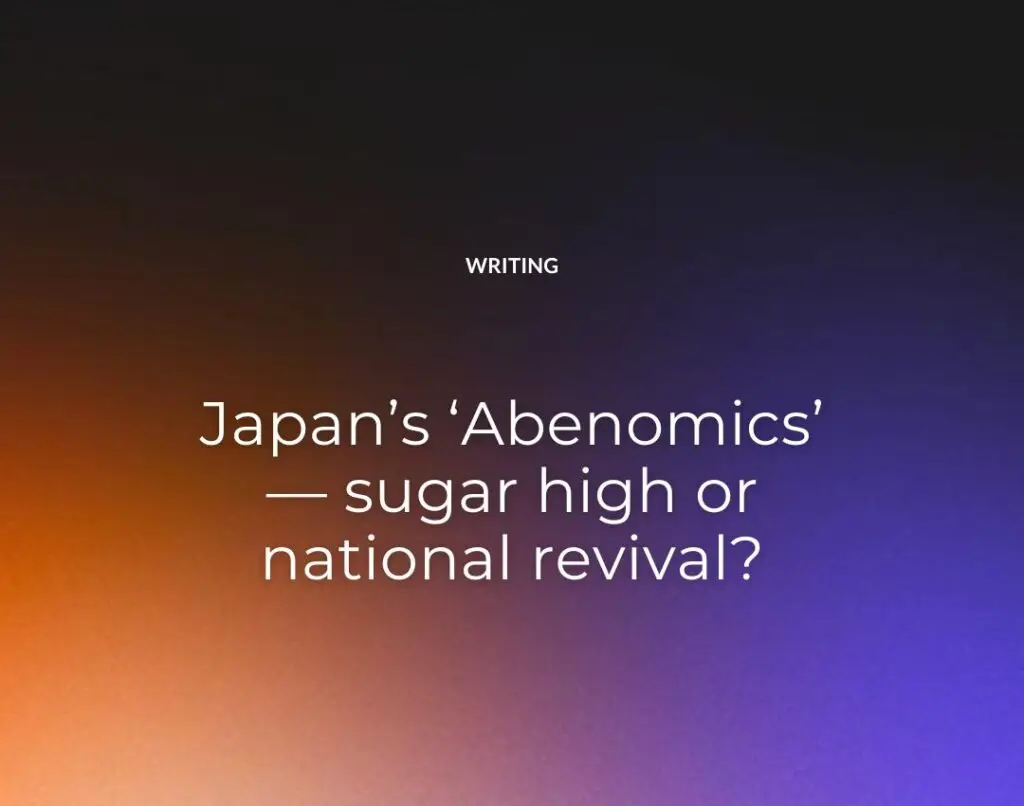By Geoffrey Cain
PRI’s The World
Jul 12, 2013
KYOTO, Japan — Natsuki Ohshima, 24, has found a gem. Straight out of college, he has scored a professional job as a corporate recruiter.
His generation, born in the 1980s, has grown up in the midst of economic stagnation lasting two decades. So even he admits that landing a corporate job at such a young age is unusual.
Japanese youth, for the most part, are indifferent to politics.
But oddly enough, some are reaping fresh energy from Prime Minister Shinzo Abe, a 58-year-old nationalist from Japan’s establishment party who is risking the farm to invigorate the economy.
“Abenomics is working,” Oshima exclaims, linking the leader’s policies to his success at landing a job. “Abenomics gets a lot of criticism, but there are certainly more merits than demerits.”
Japan is divided over the effects of this economic program — a three-pronged plan launched in April consisting of cheap credit, government stimulus spending and regulatory reforms aimed at boosting competitiveness.
Three months in, supporters say the prime minister is already reining in deflation and invigorating growth, although regulatory reforms haven’t met expectations. But “for Japan, a whole generation has been living with nothing but deflation,” said Nathan Sheets, the global head of international economics at Citigroup in New York. “It’s hard to shift the mentality of skepticism.”
So far, there are signs Abenomics is working, although experts disagree over whether the euphoria will last. On July 4, the Bank of Japan upgraded the economic ratings for eight out of its nine regions. Slightly more than half of Japanese support Abenomics, according to most polls.
The margin is slim, but it’s widespread enough that Abe’s ruling Liberal Democratic Party and its centrist coalition partner are expected to win by a landslide in the crucial July 21 Upper House elections.
Victory could mark the start of change for Japan. For the first time since 1989, Abe’s LDP would control both houses of parliament, (known as the Diet) making it easier for him to enact legislation. It’s a potential break from the deadlock of the past.
The question now is how far he’ll take Abenomics after the election, and whether he’ll back controversial regulatory reforms that could pit many Japanese against him. “Is Abe willing to use political capital to make the economy more efficient?” Sheets said. “Or will he pivot to issues like constitutional reform and the military?”
Economics aside, military strength is critical to many LDP supporters, especially in the context of disputes with China over disputed Senkaku Islands.
Last year, the LDP revealed a draft of revisions to the 1947 Constitution, which would give the emperor greater political authority and beef up the national self-defense force. Since World War II, Japan’s constitution has prohibited the country from managing a standing army.
Call it a matter of national pride.
After the surrender of Japan in 1945, American advisers hastily wrote a new constitution and put Tokyo on a path to pacifism. But since the 1950s, the LDP has hoped to introduce amendments with a nationalist bend, part of efforts to revise the history of war crimes and revive the pre-war deference to the emperor.
While amending the Constitution carries popular backing, the economy remains critical. Half of Japanese voters would like to see the economy debated more during the campaign, according to a July 7 poll by the Asahi Shimbun, the country’s second largest newspaper.
Investors poured money into Japanese markets after Abe was elected, and again after he unveiled the first two economic “arrows” — consisting of fiscal stimulus and monetary easing. Japan’s stock market has soared 60 percent, and a weak yen has pumped up exports in crucial areas like auto-making.
In mid-June, however, investors lost confidence in the third leg of his plan. Abe didn’t include a number of bold structural changes, such as in immigration and the electoral system.
Analysts say iconoclastic structural reforms would address the root of the problem, and are needed to keep the markets improving in the long term. Yet Abe didn’t want to lose conservative affluent voters for the July election, analysts say.
Japanese companies face cumbersome legal hurdles, including some of the world’s most restrictive labor laws. Businesses can only fire staff employees if they’re going out of business or restructuring, making them cautious about hiring young people for life.
So far, this unwillingness to employ means that newfound corporate wealth will be slow to trickle down to the public at large. Japanese corporations have been hoarding profits. Unemployment and wages haven’t budged, while interest rates on home loans and food prices are beginning to rise.
In the long term, success “will depend on how serious Japan is on true reform, not just the twin sugar highs of a lower yen and public works projects,” said Sean King, senior vice president at Park Strategies in New York.
“True reform includes things like trade liberalization, opening up to immigration and making it easier for women to enter the workforce,” he said.
For young people like Ohshima, the salaryman, reaching that level of true reform offers a prospect for rejuvenation. It’s a source of hope after two decades of torpor.
Lucinda Cowing contributed reporting.
The article was originally published inPRI’s The World
See Also:





